As cat owners, we often wonder if our feline friends can enjoy some of the same foods we do.
Understanding which human foods are safe for cats is crucial to ensure their health and well-being.
As a responsible cat parent, I’ve always wondered what human treats I can share with my precious fur baby. I’ve studied and am now here to share my knowledge to guarantee their welfare.
Cats can be quite curious creatures; sometimes, they might sneak a nibble from our plates.
While some human foods are safe, others can be downright dangerous. Understanding the dos and don’ts is crucial to keeping our feline companions happy and healthy.
In this educational post, I’ll review a few human foods cats can consume safely.
We’ll learn which delectable foods—from fish and chicken to specific fruits and vegetables—can be shared without concern with our furry friends.
Let’s embark on this journey together, exploring the tasty treats perfectly safe for our beloved kitties!
Table of Contents
What Human Foods Are Safe For Cats?
I’m here to share some insightful information on cat-safe human foods. It’s vital to remember that each cat is unique. Therefore, it’s important to watch how they react when you introduce new foods.
As a responsible pet owner, you may wonder if sharing some of your favorite human foods with your feline friend is safe.
While cats have specific dietary needs, a few human foods can be safe and beneficial in moderation.
Let’s explore the top 11 human foods that you can share with your cat:
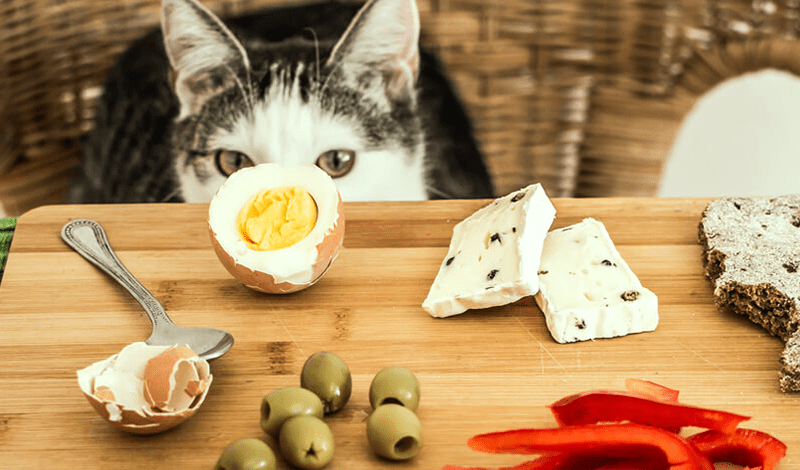
1. Cooked Chicken
Your cat can get a lot of lean protein from cooked chicken. Protein is essential for your feline friend’s general health and wellbeing since it helps with muscle growth and repair.
When sharing chicken with your cat, ensure it is cooked thoroughly and free from any seasoning or bones hazardous to your pet’s health.
Offering small, boneless portions as an occasional treat will be much appreciated by your furry companion.
2. Salmon
Omega-3 fatty acids are well known for being abundant in salmon and essential for preserving your cat’s skin and coat health.
These fatty acids can help prevent skin dryness and irritation, giving your cat’s fur a lustrous and healthy appearance.
However, it’s crucial to serve fully cooked salmon and remove any bones, as raw or undercooked fish can contain parasites or bacteria that might harm your feline friend.
3. Pumpkin
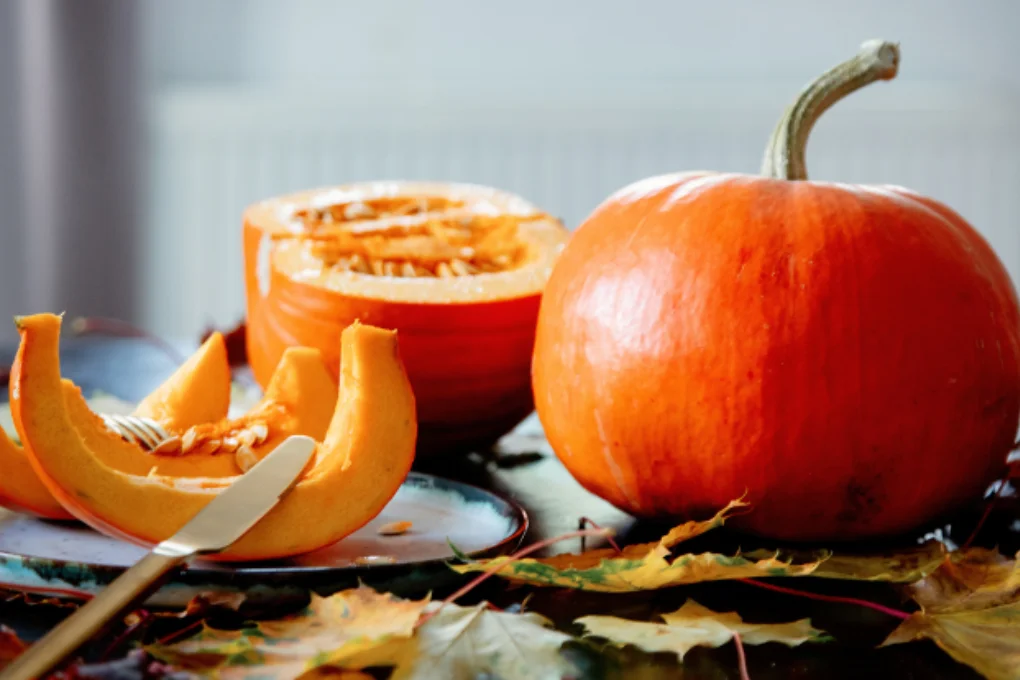
Surprisingly, pumpkin can be a valuable addition to your cat’s diet. The high fiber content in this low-calorie diet can improve your cat’s digestion and prevent hairballs.
Choose plain, canned pumpkins without added sugar or spices, as these additives are unsuitable for your cat’s delicate digestive system.
4. Blueberries
These tiny, delicious berries are not only a delightful snack for you but can also be a healthy treat for your cat.
Antioxidants found in abundance in blueberries can assist your cat’s immune system and shield it from oxidative stress.
However, due to their natural sugar content, it’s best to offer blueberries to your cat in moderation to avoid any potential weight gain or blood sugar spikes.
5. Cooked Eggs
Eggs are an excellent source of protein, vitamins, and minerals for cats. Cooked eggs are safe for your feline friend and can be a wholesome addition to their diet.
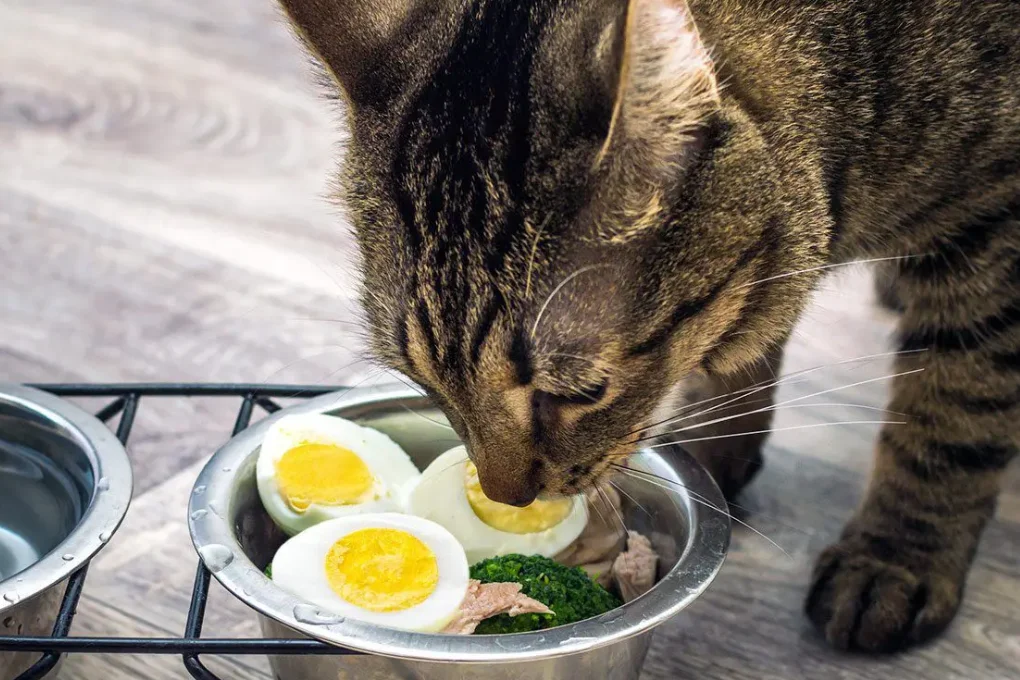
The protein in eggs helps maintain your cat’s muscles and provides essential amino acids. Ensure the eggs are fully cooked to avoid any risk of salmonella, and offer them in small portions as an occasional treat.
6. Spinach
Even though it might not be your cat’s favorite food, spinach can contribute important nourishment to their diet. Iron and vitamins A, C, and K are among the vital nutrients found in this leafy green vegetable.
These vitamins and minerals can benefit your cat’s general health. However, it’s important to serve spinach in moderation.
Spinach consumption in excess may prevent the body from absorbing calcium, which could have negative health effects.
7. Cheese
Many cats find cheese irresistible, an enjoyable and special treat. Cheese contains calcium and protein necessary for the healthy development of your cat’s bones and muscles.
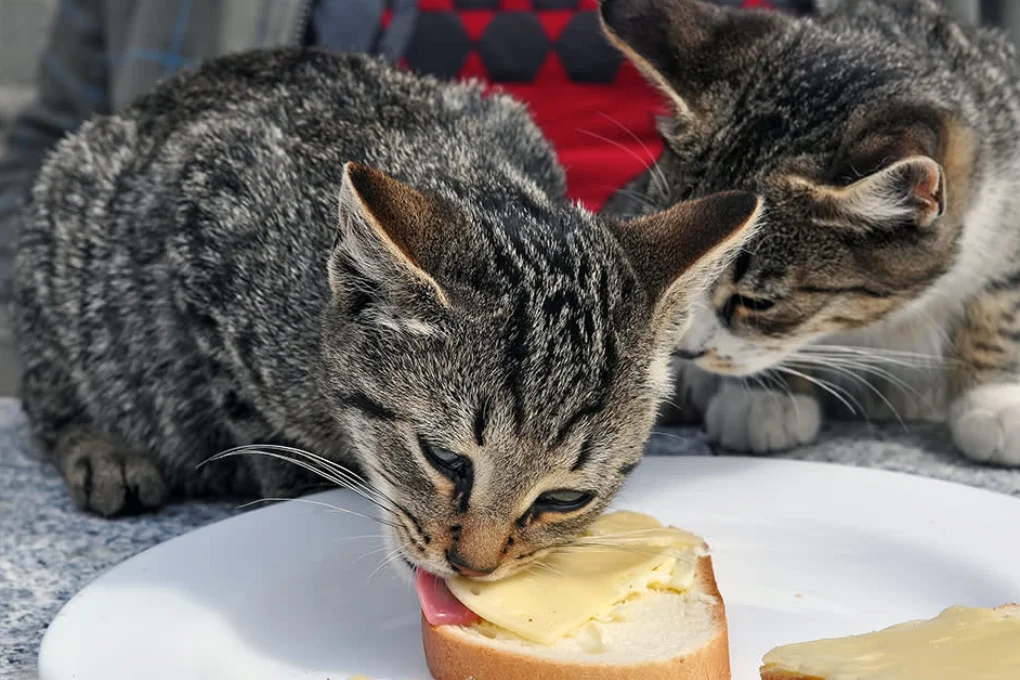
The consumption of dairy products might cause digestive discomfort in certain cats who are lactose intolerant, so it’s crucial to keep that in mind.
If your cat shows discomfort after eating cheese, it’s best to avoid offering it in the future.
8. Carrots
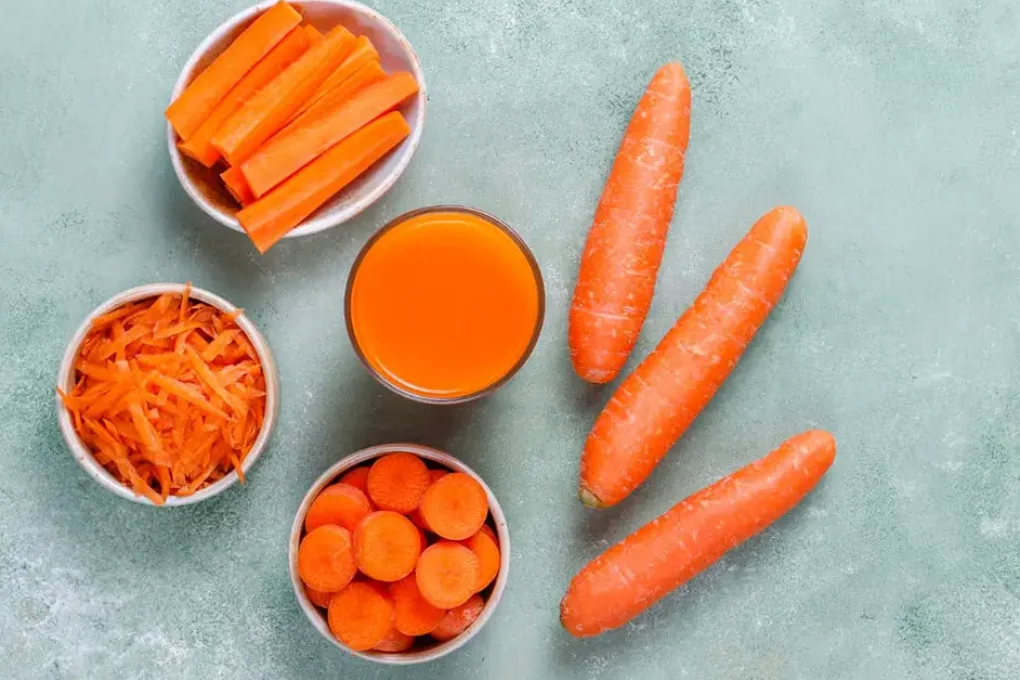
Your cat’s friend may enjoy a crunchy and healthy snack of carrots. These fiber-rich, low-calorie orange vegetables are nutritious to your cat’s diet.
You can offer them cooked or raw, thinly sliced or grated, as a tasty treat that supports your cat’s digestive health and provides essential vitamins.
9. Plain Yogurt
Plain yogurt is another human meal that can benefit your cat because it contains probiotics. Probiotics are “good” bacteria that promote digestion and general gastrointestinal health by supporting healthy gut flora.
However, ensure that the yogurt is plain and does not contain added sugars or artificial sweeteners, as these can harm your cat.
10. Cooked Turkey
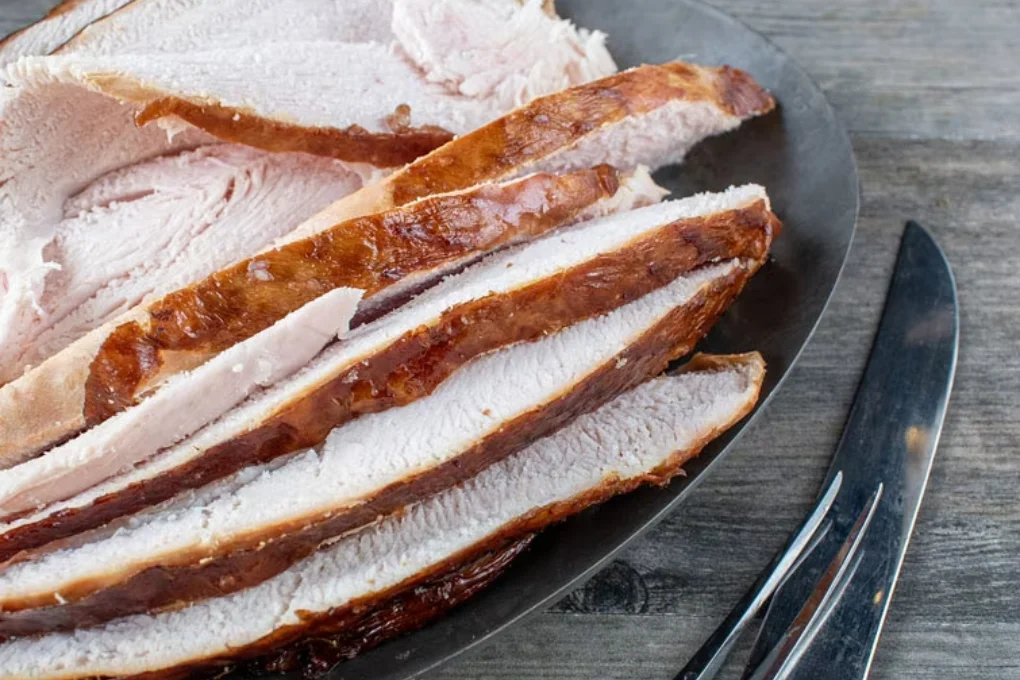
Cooked turkey can be a delicious and protein-rich treat for your cat, much like chicken. Cats are obligate carnivores, meaning most of their diet’s protein must come from animals.
Offering small amounts of cooked turkey, free from bones and skin, can be a delightful way to add variety to your cat’s diet.
11. Oatmeal
Oatmeal provides additional fiber for your cat’s digestive health. This healthy grain can help control bowel motions and avoid constipation.
Ensure the oatmeal you serve your cat is plain and cooked without sugar or artificial sweeteners, as these ingredients can hurt your cat.
As with any new food, it’s essential to gradually introduce these human treats to your cat’s diet and observe how they respond.
Individual preferences and sensitivities can differ, and cats have specific dietary needs. If you notice any adverse reactions or digestive issues, discontinue the food and consult with your veterinarian.
Always remember that a well-balanced and nutritionally complete cat food should remain the primary part of your cat’s diet, and these human foods should only be offered occasionally and in small amounts as treats.
When designing a balanced and secure feeding plan, your cat’s demands and tastes can be considered.
What Kind of Human Food You Should Avoid Feeding Your Cat?
As an expert blogger and a responsible cat owner, it’s crucial to be aware of the human foods that can harm your feline friend.
Avoid feeding your cat the following foods:
• Chocolate: Chocolate contains theobromine, which is toxic to cats and can lead to severe health issues.
• Onions and Garlic: These foods can cause damage to your cat’s red blood cells and lead to anemia.
• Grapes and Raisins: These fruits can result in kidney failure in cats.
• Alcohol: Even small amounts can be poisonous and cause serious health problems.
• Caffeine: Coffee, tea, and energy drinks are dangerous for cats and can cause heart problems.
• Bones: Cooked bones can splinter and harm your cat’s digestive tract.
• Dairy Products: Many cats are lactose intolerant, and dairy can lead to digestive issues.
• Xylitol: This artificial sweetener is toxic to cats and can cause hypoglycemia.
• Raw Meat and Fish: They may contain harmful bacteria and parasites.
• Nuts: Some nuts, like walnuts and macadamia nuts, can be toxic to cats
• Salty Foods: Excessive salt can lead to sodium ion poisoning in cats.
Keeping these foods out of your cat’s reach and avoiding sharing them, even in small quantities, is essential.
Always prioritize your cat’s health and wellbeing by giving them a balanced and nutritionally adequate diet.
Seek quick veterinarian care if you think your cat may have consumed poisonous food. Prevention and education are essential to ensure your cherished feline companion’s safety and happiness.
What human food is safe for kittens?
Remember, a kitten’s diet is crucial for their growth and development. Here are some kitten-friendly human treats:
▶ Cooked chicken or turkey: A good source of protein for their tiny bodies.
▶ Plain-cooked fish: Provides essential omega-3 fatty acids.
▶ Boiled eggs: High-quality protein for their growing muscles.
▶ Cooked carrots or pumpkin: Nutritious and easy to chew.
▶ Cooked rice or oatmeal: Gentle on their sensitive tummies.
But always be cautious and avoid foods like chocolate, onions, garlic, milk, and caffeine, as they can harm kittens.
Stick to a specially formulated kitten food for their main diet and use these human treats occasionally and in moderation. This will keep those little furballs happy and healthy!
Feeding Tips and Precautions
1. Introduce New Foods Slowly: Always introduce new foods gradually to monitor for adverse reactions.
2. Portion Control: Treats should not exceed 10% of your cat’s daily caloric intake.
3. Avoid Seasonings: Never feed seasoned or spiced food to your cat.
4. Cook Thoroughly: Ensure all meats and eggs are thoroughly cooked to avoid the risk of bacterial infections.
Is It Bad To Feed Cats Human Food?
Feeding cats human food can potentially be harmful. Some human foods, such as chocolate, onions, garlic, grapes, and raisins, may be toxic to cats.
Certain spices, like garlic and onion powder, should be avoided. Caffeine and alcohol are also unsafe.
High-fat foods can lead to digestive issues and obesity in cats. Bones can cause choking or injuries to the digestive system.
Cats have specific dietary needs. Human food may lack essential nutrients. Feeding too much human food can lead to nutritional imbalances.
Table scraps shouldn’t make up a significant portion of a cat’s diet. It’s best to stick to balanced and species-appropriate cat food.
Consulting with a veterinarian is crucial before introducing human food into a cat’s diet.
Can my cat eat rice?
Yes. Rice can be a fun and safe treat for your cat occasionally. They might paw-positively enjoy it!
Cooked plain rice in small amounts can be a yummy addition to their diet. Avoid seasoning or adding any spices, especially spicy ones! Cats aren’t fans of spicy purr-rito.
Remember, moderation is the key! Too much rice might turn your cat into a rice-aholic!
Always consult with your veterinarian to ensure it suits your cat’s dietary needs. So, rice up the food bowl with some feline-approved goodness!
FAQs
Can I give my cat small pieces of cooked turkey on Thanksgiving?
Yes, small pieces of cooked turkey without seasoning can be a delightful treat for your cat during Thanksgiving. Just make sure it’s boneless and given in moderation.
Is it safe to give my cat a piece of watermelon in summer?
While watermelon is non-toxic to cats, it’s not a necessary part of their diet. If you offer it as a treat, remove all seeds and only provide a small amount.
Can cats eat peanut butter?
Plain, unsalted peanut butter without xylitol is generally safe in small amounts. However, some cats may not enjoy the taste, so it is best to offer it as an occasional treat.
Are there any human foods that can improve my cat’s coat health?
Foods rich in Omega-3 fatty acids, such as cooked salmon, can promote a healthy and shiny coat in cats. However, feeding these in moderation is essential to avoid any nutritional imbalances.
Conclusion
What Human Foods Are Safe For Cats? While some human foods can be delightful treats for cats, their primary diet should consist of specially formulated cat food.
Treats and human foods should only complement their regular meals, helping to add variety and joy to their dining experience.
It is crucial to be aware of items like chocolate, onions, garlic, caffeine, and alcohol that are harmful to our pets. Even though we like to spoil our cats, their health always comes first!
Lean meats, certain vegetables, and some fruits can be safely incorporated into their diet in moderation.
Always consult your veterinarian before introducing new foods to ensure they meet your cat’s dietary requirements.
So, let’s continue to be aware and choose wisely for our canine friends. By providing love, care, and a well-balanced diet, we can ensure our cats enjoy their best and healthiest lives.

Hi there! My name is Koushik; I am a cat lover. I specialize in writing about pet care & food. I have a wealth of knowledge on cat food niches and related subjects. I have worked in the pet industry for over 5 years and am passionate about helping cat owners provide the best care for their furry friends. With knowledge of cat food and nutrition, I aim to share their insights and help cat owners navigate the world of cat food niches. I enjoy playing with my two cats, reading, and exploring new cat food brands in my free time.
4 thoughts on “What Human Foods Are Safe For Cats? Best 11 Human Foods Are Safe For Cats”